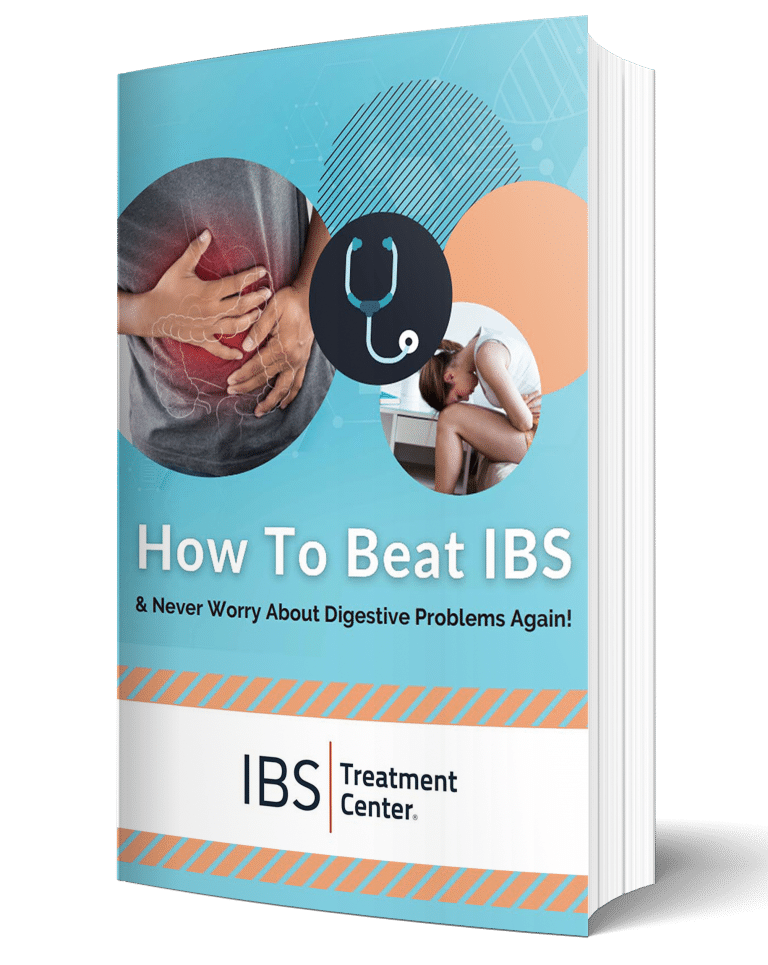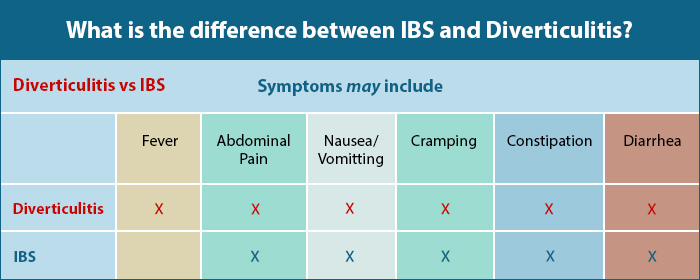Diverticulitis, although not Irritable Bowel Syndrome (IBS), is closely related to IBS.
What is Diverticulitis?
Diverticulitis is the diagnosis given to people who develop inflammation as a result of diverticulosis. Diverticulosis is the presence of weak pouches in the colon called diverticula. Diverticulosis is generally diagnosed from a colonoscopy or a barium contrast x-ray.
It is estimated that by the age of 70 at least 50% of the American population has developed diverticulosis. Diverticulosis by itself does not cause symptoms, but as a result of it some people will develop diverticulitis and thus pain in the lower abdomen, often associated with diarrhea.
Diverticulitis vs IBS
The difference between diverticulitis and IBS is usually subtle, which is why these two conditions can be easy to confuse. The symptoms may be exactly the same, but the difference is seen only by your doctor, either on an abdominal CT scan or during a colonoscopy.
In either case, the pockets of diverticula are what the doctor sees on these exams. Your experience of these two conditions, however, may be the same, although sometimes people with diverticulitis also have an infection with a fever. Even doctors have trouble differentiating between these two conditions, as highlighted in this study Clinically Diagnosed Acute Diverticulitis in Outpatients: Misdiagnosis in Patients with Irritable Bowel Syndrome.
What Causes Diverticulosis?
Diverticulosis is generally thought to be caused by excessive pressure in the colon, which may be combined with a weakening of the colon due to age, inflammatory damage, or both. This pressure is likely directly associated with constipation, although many people don’t recognize themselves as having constipation. What many people have come to think of as normal bowel habits may be far from healthy or normal.
The prevailing theory is that a lack of fiber in the diet ultimately leads to the development of weak pouches in the colon. This is basically another way of saying that people don’t eat enough vegetables and don’t have as healthy of a diet as they should. How many other conditions can you think of that are caused by the same problem? Also, like many chronic conditions, the incidence is far higher in western countries than in the rest of the world, and people from other countries who switch to a western diet have a much higher incidence of diverticulosis.
How is Diverticulitis Treated?
Diverticulitis patients are encouraged to increase their intake of fiber and water. If a fever develops, then they are given antibiotics for the infection.
Unfortunately, a significant number of people with diverticulosis develop so much damage to their colon that they require surgery. Surgery is performed to remove the damaged portion of the colon, and in some cases results in the removal of the entire colon.
Although this resolves the diverticulosis, it doesn’t address the original cause of the damage. And in many cases, people continue to suffer from abdominal pain and other digestive symptoms.
The real issue remains: Why was there so much damage and inflammation in the first place?
The answer is usually far more complicated than a simple lack of fiber or water. The same issues that cause inflammation and digestive symptoms in IBS also cause problems in diverticulosis. The two primary areas of concern that need to be addressed are food allergies and imbalances in the ecosystem of the digestive tract. These are complex issues and are rarely addressed properly.
IBS and Diverticulitis FAQs
How do I tell if I have diverticulitis or IBS?
Diverticulitis must be evaluated by your gastroenterologist. Once it is established you have diverticulosis, then whenever you get lower abdominal pain it is often assumed that you are suffering from diverticulitis. This may or may not be true. It’s very difficult to know for sure, and often you are suffering from IBS, or both diverticulitis and IBS.
Can you have diverticulitis and IBS?
Yes, you can have both simultaneously. It’s a very common problem. Many people who think that they are suffering from diverticulitis are actually having a flare-up of IBS. And having one of these conditions increases the risk of developing the other.
Foods to avoid with diverticulitis and IBS?
Doctors often recommend that people with diverticulitis avoid nuts and seeds. The theory is that these types of foods will not be well digested, and then will make it to the colon and will get stuck in the diverticula. Once stuck in the diverticula they will, in theory, cause an infection which will lead to diverticulitis. It’s a very convincing idea, but there has never been any direct evidence that this is what indeed causes diverticulitis. Studies have not shown that foods are getting stuck in the diverticula.
What does an IBS diverticulitis diet include?
There is no single diet that will be successful for all IBS and diverticulitis sufferers. A diet that successfully prevents IBS or diverticulitis will vary a great deal from patient to patient. However, the good news is that there is a diet that will make a huge difference in how you feel. But you must work with an expert to find the right diet for you.
Can IBS lead to diverticulitis?
There is no medical evidence that suggests that IBS leads to diverticulitis. However, this IBS diverticular disease research study proved, people with IBS have a significantly increased risk for developing diverticulosis. This explains why people can have both IBS and diverticulitis, and why they often get them confused.
Can diverticulitis lead to IBS?
Diverticulitis can lead to IBS. Some people develop IBS after an attack of diverticulitis. This is known as post diverticulitis IBS. However, this probably does not occur as often as originally thought. There is a high frequency of IBS initially being misdiagnosed as diverticulitis according to this diverticulitis research study that focused on misdiagnosis in patients with IBS. This may give the impression that diverticulitis was first and subsequently led to the development of IBS.
What is post diverticulitis IBS?
Diverticulitis is considered an infection of the diverticula. Post diverticulitis IBS is essentially the same as post-infectious IBS. It may be diagnosed when one begins to experience IBS after an attack of diverticulitis. Fortunately, this form of IBS is also treatable.
What are the best probiotics for IBS and diverticulitis?
There are literally hundreds of different kinds of bacteria that live in your digestive tract, and therefore hundreds of different kinds of probiotics. The best probiotics for treating IBS and diverticulitis will vary based on the individual needs of the patient. This must be properly assessed before any recommendation can be made on which probiotics are best for that patient.
Ready to Treat Your Diverticulitis
Successfully treating diverticulitis remains a key component of what we do at the IBS Treatment Center and is very similar to our approach to IBS. To learn more about our approach, please give us a call 888-546-6283 at or schedule an appointment with us. We have a telemedicine option so there is no need to come to our office in person.

Dr. Wangen is the founder and medical director of the IBS Treatment Center, the award winning author of two books, and a nationally recognized speaker on digestive disorders. He has been on ABC, NBC, and Fox as well as public radio, and was named one of Seattle’s Top Doctors by Seattle Magazine.


